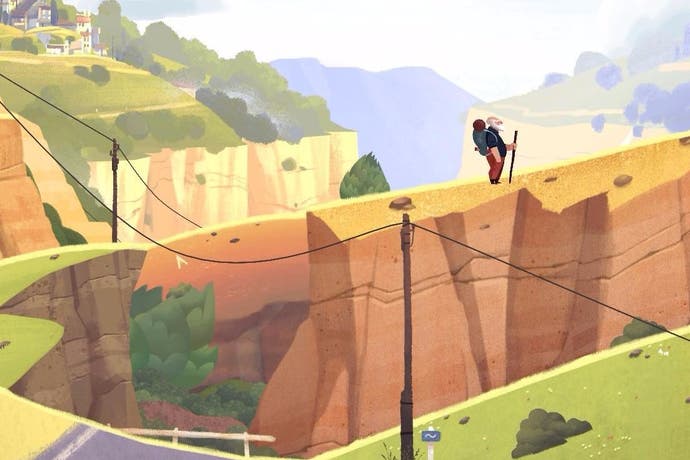Old Man's Journey review
Reverieman.
Old Man's Journey feels a lot like a children's book - one of those beautiful ones, with huge illustrations brightly printed on decent paper. The kind a certain kind of person might not really want to read with actual children, who would spill things, crease things, crayon all over things. The kind that might have a gentle gimmick to it - things to spot on each page, the odd flap to lift, a special kind of paint that reveals a texture when carefully presented with the whorls of the fingertips. The kind of book that doesn't come down off the shelf very often.
A simple tale told with an interactive twist, this is the story of an old man who gets a message that sends him off on a lonely journey, crossing vast stretches of countryside, moving from mountains to little villages, travelling by car, by train, by hot air balloon. The interactive twist is this: as you move this old man around the world's beautiful 2D landscapes, pastel colours bringing bucolic life to everything from an abandoned windmill to a scrabbly field where sheep graze, you create a path for him by raising and lowering different parts of the ground. Say there's a range of hills in front of you, but none of them seem to connect. You can take one hill and ease it down a little, so that its edge meets the edge of the hill beneath it. The old man can then travel along that edge - always along the edge - and move from the first hill to the second and then onwards.
There are rules: you cannot move a piece of the landscape that the man is currently standing on, and you cannot move landscape further than it wants to go. There are also a handful of additional things to take into account, such as those sheep, who will block the man's path unless they are prodded out of the way, moving from one patch of grass to another, or waterfalls, which will drop the man down a level if he tries to cross them. Old Man's Journey is not really a puzzle game, however: it's a sort of ruminative travelling game with a little puzzling thrown in to keep you engaged. It's a nice enough distraction, but I never quite had the moment I was expecting, where this whole raising-and-lowering mechanic truly married with the theme of the narrative in a way that wasn't rather trite.
Oddly for such a self-consciously ponderous game, the whole thing comes together most cleanly at moments of speed. When the old man boards a train there's a lovely few minutes of helping him race through the countryside, connecting the track beneath him. Where things start to get ever so slightly wearying - and it's really only ever so slight an annoyance - is when the game is at its most gamelike. Those sheep who need to be moved between positions on the landscape make for puzzles that are clever but a little bit of a drag, while a section in which you have to coax stone wheels to roll downhill and smash through walls is a touch too artificial. Nobody really wanted these puzzles, I suspect. I wonder if they've ended up in the game because it was assumed that other people might want them. The legendary "other people" in designers' minds, who are always pulling a design out of alignment with compromises.
Minor annoyances, but I did wish at times that Old Man's Journey, which is already a fairly short game, had the confidence to be even shorter, shorn of its padding and repetition. I also wish that it didn't cling so tightly to an emotional arc that is starting to feel a bit predictable for games of this ruminative, emotion-plucking nature.
There are lovely moments in Old Man's Journey - moments when you run your mouse over a scene and the scene registers your mouse's presence, allowing you to swish wind through the trees, knock open the shutters on a house, or jingle fairy lights strung across the branches of a tree. As a whole, though, I found it beautiful but quietly non-engaging - like one of those children's books that's so delicate and pretty and calculated that you never really reach for them anymore.


